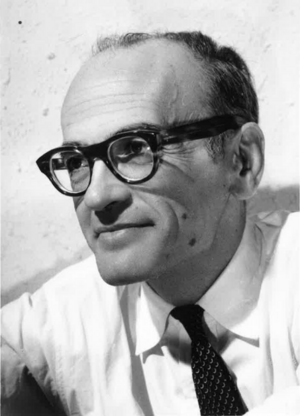Manuel Andújar (writer) facts for kids
Quick facts for kids
Manuel Andújar Muñoz
|
|
|---|---|
 |
|
| Born | 4 January 1913 La Carolina, province of Jaén, Spain
|
| Died | 14 April 1994 (aged 81) Madrid, Spain
|
| Nationality | Spanish |
| Occupation | Writer |
Manuel Andújar Muñoz (1913 – 1994) was a Spanish writer. He wrote many different kinds of books, including novels, plays, poems, and essays. He lived through a difficult time in Spain's history, which influenced his writing.
Contents
Manuel Andújar's Early Life and Studies
Manuel Andújar spent his early years in towns like La Carolina, Linares, and Málaga in Spain. He went to school in Málaga, but a sickness called poliomyelitis (a serious illness that can affect muscles) stopped his studies for a while. Even then, he started writing articles about books.
In 1932, he moved to Madrid and finished his accounting studies. He then worked as an administrator in Lérida and Barcelona. During this time, he secretly joined the Communist Party, a political group. When the Spanish Civil War began, he worked as a journalist.
After the war, he was held in a camp in France called Saint-Cyprien. Later, he moved to Veracruz, Mexico, in 1939. He lived there until 1967, though he also visited other countries in Latin America. In Mexico, he worked for an import business, translating letters into English and French. He also worked in advertising.
Manuel Andújar helped start a magazine called The Spaniards. This magazine was a place for Spanish writers and poets who were living outside their home country to share their work. While in Mexico, he wrote poetry, his first plays, and a series of three novels called The Days Before. These books were about the time leading up to the Civil War.
He also worked as a news reporter and for a watch company, which connected him to radio and advertising. In 1946, he became the director of promotions and publicity for a book company and a famous Mexican publisher. He worked there for eleven years.
Manuel Andújar's Career as a Writer
In Mexico, Manuel Andújar became well-known as a writer. He wrote books that explored the ethical and historical problems of violence. He met and worked with many other journalists and writers.
In 1967, he returned to Spain. There, he continued to write and also worked for a publishing company called Editorial Alliance. In 1985, he was given a special honor and named "Favorite Son of Andalusia," which is his home region in Spain. He passed away in Madrid in 1994. Today, many of his writings are kept in an archive in Jaén, Spain.
Manuel Andújar wrote many different types of books.
- Novels and Stories: He wrote novels and short stories, which were collected in a book called Narrations (1989).
- Poetry: Some of his poetry collections include The Correct Image (1961) and Bell and Chain (1965).
- Plays: He wrote plays like The Stolen Dream (1962).
- Essays: He also wrote essays, which are non-fiction pieces that explore ideas. One example is Narratives of a Spanish Exile and Latin American Literature (1974).
His work was not published in Spain until 1986. He created a large series of novels that tell the story of 20th-century Spain, which he called Lares and Penates.
Manuel Andújar's Trilogies
Manuel Andújar wrote two main series of three novels, known as trilogies.
- The Days Before: This trilogy describes the time before the Civil War. It includes:
* The Plain (1947): This story is about a family in a village called "Las Encinas." The mother, Gabriela, protects her family after her husband is killed. * The Conquered (1949): This book is about the lives of miners. * The Destiny of Lazarus (1959): This story focuses on life by the sea.
- Histories of a History: This trilogy tells stories from the Civil War itself. The first version in 1973 was censored (meaning some parts were removed), but a complete version was published in 1986.
He also wrote other novels that completed his big story cycle, such as The Voice and the Blood (1984) and Appointment of Ghosts (1984).
Other Important Works
Some of his important essays include Catalan Literature in Exile and Andalusia and Hispanoamerica: Crucible of Cross-Breedings. He also wrote short stories and chronicles, like Empty Spaces (1971) and Saint-Cyprien, Plague. Concentration Camp (1942), which was about his time in the camp. Other works include The Shadow of the Beam (1968) and A Gentleman with a Saffron Beard (1992).
Body of work
- Narrations, 1989
- The Correct Image, 1961
- Bell and Chain, 1965
- Dates of a Return
- Feelings and Desires, 1984
- The First Last Judgement
- The Anniversaries
- The Stolen Dream, 1962
- Fractured Crystal (1945)
- The Plain (1947)
- The Conquered (1949)
- The Destiny of Lazarus (1959)
- Histories of a History (1973, censured version, and 1986, complete version)
- The Voice and the Blood (1984)
- Appointment of Ghosts (1989)
- Magic Date (1989)
- Narrative of the Spanish Exile and Latin American Literature, 1974
- Catalan Literature in Exile
- Andalusia and Hispanoamerica: Crucible of Cross-Breedings
- Exclamation Points (1986)
- Empty Places (1971)
- The Luminous Strip (1973)
- Secret Predictions
- Parting from Anguish (1944)
- Saint-Cyprien, plague. Concentration Camp (1942)
- The Shadow of the Beam (1968)
- Everything is Foreseen
- A Gentleman With A Saffron Beard (1992)
- Letters are Letters, collected letters
See also
 In Spanish: Manuel Andújar para niños
In Spanish: Manuel Andújar para niños
 | Stephanie Wilson |
 | Charles Bolden |
 | Ronald McNair |
 | Frederick D. Gregory |

